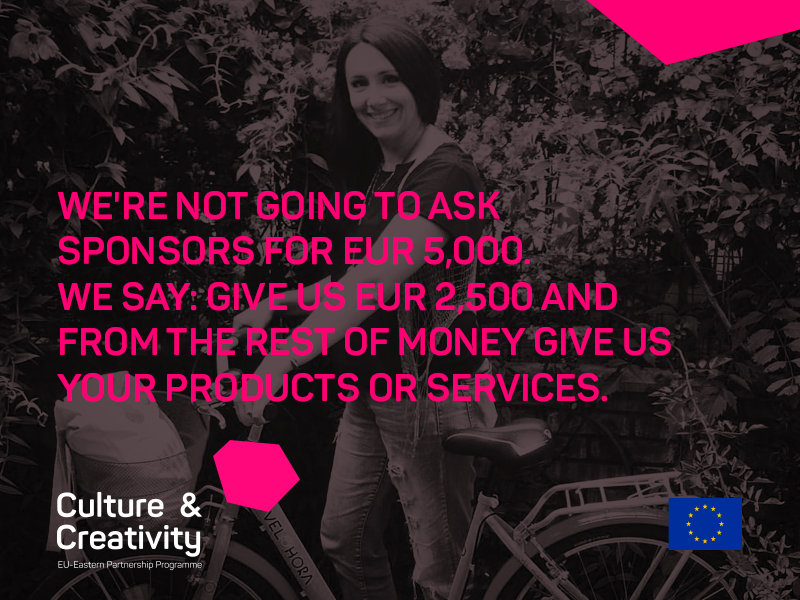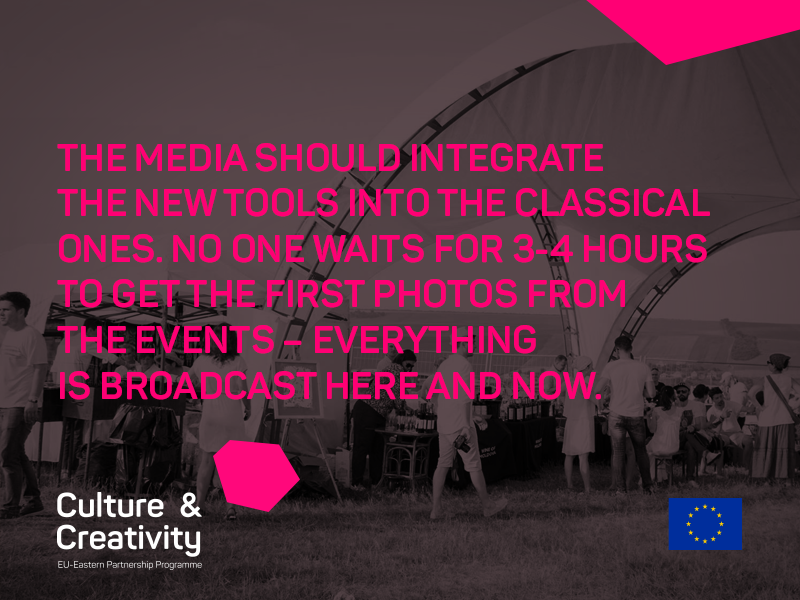
Nata Albot: Romanticism Aside – Culture Should Be Delivered in a Different Way
The place of culture in a crisis-dominated society
We should let the romanticism aside and see culture not only as a relief for the soul, but also as a platform, a great tool for creating monetary values. This, of course, will be possible if demand is created. A demand for culture should be developed, to be consumed like any other food, either for the soul or for the stomach. Once this demand is developed, it should be capitalized. I don't believe in culture without money.
Educating rather than creating demand for culture
The market exists with or without us, but it should be educated to understand the importance of culture consumption both for the education itself, and for diversification of human existence. It is one thing to educate a person that this is important, and a totally different thing to say that it is cool and makes the life more interesting. Therefore, we should adjust to the existing society.
How to educate people who don't have enough financial resources to meet their basic needs?
When seeing how big the crisis in society is, many people would ask: “Why do we need these festivals?” Or, people should understand that consumption of culture generates a process of economic exchange, economic growth and some financial flows. Sponsors invest money in the organization of projects, projects involve artists and other partners, who, in their turn, use these resources, are promoted and get the necessary feedback to reinvest in culture. So, it is an interdependent relationship.

Last, but not least, culture should be a business. This doesn't mean that we must transform the culture into a business, but it should have its economic basis to justify itself including in times of crisis. This means that now we should think: what about the artists, should we leave them die of starvation, or continue to support them even when people do not have money for them?
Finance redistribution: from challenge to opportunity
Usually, the marketing gives us money for culture, i.e. the budgets planned for companies’ marketing are used for events, including cultural projects. But the economic crisis hits marketing the first and the most. I think those few (limited) budgets should be directed towards culture.
In fact, I have always believed that although culture can be a business, it is not a super profitable business. This is why, culture has always required Government support – and I see this in the country I am living now. As prosperous the Canadian society is, all cultural projects are subsidized from public budgets, guaranteed by the State, which secures the events continuity.
Without these funds, how do you organize festivals here, in Moldova?
Crisis management is the answer to your question. We adjust ourselves to the existing conditions – we don't give up, we don't close down the business, we don't let our hands down and say “pass”. We say: We rented tents last year, but this year we don't have money for this. Then, we won’t rent tents! We simplify the processes, invest less in decor, but we continue organizing these events. It is true that they would be a little primitive, simplistic, but we will use more voluntary work, giving the opportunity to young people to gain experience, whether there is crisis or not. This experience can help them to move forward to find a job or to offer volunteer services to other companies.

Even during the times of crisis companies need visibility and even if they don't have a marketing budget, they have their products or services. An example is “Panilino” company. They produce pies and I need to feed my volunteers. Rather than spending my little financial resources on food, it is better to make a partnership with “Panilino”, which would feed my volunteers. Thus, I save some resources and pay for my team’s work. Or, for instance, “Om” water. We are partners and I ask them that, under the contract, to supply a certain quantity of water given to the volunteers.
At the same time, I think that one of the biggest risks that I ran the last two years was the lack of professionalism and responsibility from the part of companies in the signing of contracts and failure to honour their commitments.
The power of contracts in Moldova is “We have included some penalty clauses, so what? Who would bring the case to the court and waste time and resources for this?
Recently, [the 3rd edition of Mai Dulce festival of desserts took place in May] it happened that we went to the legal department of the company, where we negotiated the whole contract. We didn't ask for money, but food for volunteers worth a certain amount of money (which was reduced twice during the negotiations and we accepted it), and on the last day they didn't answer their phone and sent just a simple email: “We are sorry, but we cannot support you”.
I think this is a risk, because you rely on them and don't search for other partners, and if they change their mind in last minute you don't know what to do and how to overcome this situation. But I don't panic, every time I say that it could have been worse, that it is still fine and we will make it through.
In the last such case, I reoriented quickly, I remembered that a company once, long ago, sent me an email and asked me if we could establish a partnership. I contacted them and said, “The right time has come”.
The biggest problem in times of economic crisis is that we have two barricades: on one barricade are those who sell products and services, and on the other are the consumers.
It is very important that both barricades act together in these moments and not stick to the same rental fees, so that ordinary people spend their resources to fill the someone’s pockets. The approach should be the following: to charge only a part of the ordinary rental fee, so that both sides manage to survive.
We should find nonconformist ways to communicate, such as the Instagram, Facebook, short videos, live broadcasts – i.e. to capture the public taking them through a live broadcast on Facebook directly from the event. These messages should tell them: „Hi! We are there and today we inaugurate the exhibition of painter X. Perhaps you don’t have time to leave your office or kids, so let me show you what is here.” And you go to show them the paintings, possibly with an expert to present them and explain why a painting costs EUR 2,000 and where it ended up, in what distant country. In this was you captivate the person.

For the beginning, we should integrate the new formats without giving up on the classical media and we should start using the new tools, such as the phone apps. Today, the whole Western press has applications for mobile phones that allow viewing quickly and easily the content, without having to access the website on your phone. You launch the application, get the information quickly, in a format adjusted to your phone, and so on.
We should also use, as I said earlier, Facebook or Twitter. I'm subscribed on Twitter, for example, to different types of channels, such as Huffington Post or Buzzfeed; so I receive every day, at exact hours, the notice that Huffington Post is broadcasting live a certain event or activity, tells me what are the latest trends in swimwear or how stars look on the red carpet.
How to get the authorities’ support?
In a country facing such a profound economic, political and social crisis the community should assume these things. Thanks to social media, the culture started to penetrate easier into the society. I mean you don't have to wait for a newspaper once a week to find out what happened in the culture field: today, there are hundreds of communities on FB, where subscribing, you find out what happens in sculpture, mural art, cultural projects.
I think now the culture is doing much better than in the past; we just need to find the proper tools to communicate and reinvent it, because culture needs a re-engineering.




